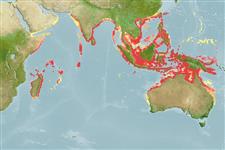Common names from other countries
Environment: milieu / climate zone / depth range / distribution range
Ecologia
marinhas; Água doce; estuarina pelágico(a,os,as); anádromo (Ref. 51243); intervalo de profundidade 6 - 55 m (Ref. 12260). Tropical; 25°N - 30°S, 43°E - 155°E (Ref. 54703)
Indo-West Pacific: Indian Ocean: east coast of Africa northward from about Durban (Ref. 3509) to the Gulf of Oman (Ref. 188), including Madagascar (Ref. 188, 3509), the coasts of India and Andaman Sea (Ref. 188, 6867), and south to western Australia (Ref. 188); also South China Sea (Ref. 188), and Indonesia to northern Australia and Papua New Guinea (Ref. 188, 6867).
Length at first maturity / Tamanho / Peso / Idade
Maturity: Lm 13.5 range ? - ? cm
Max length : 16.0 cm SL macho/indeterminado; (Ref. 188); common length : 13.0 cm SL macho/indeterminado; (Ref. 2871)
Espinhos dorsais (total): 0; Raios dorsais moles (total): 16-19; Espinhos anais 0; Raios anais moles: 34 - 42. Diagnosis: Body moderately deep, compressed, belly with strongly keeled scutes, 17-20 pre-pelvic and 8-10 post-pelvic scutes, with a total of total 25-29 scutes (Ref. 188, 6867). Eye large; lower jaw projecting; upper jaw with a toothed hypomaxillary bone between hind tip of pre-maxilla and lower bulge of maxilla blade; lower gillrakers 22-27; dorsal fin origin near midpoint of body; pelvic fins present; anal fin with 34-42 finrays; scales with upper and lower vertical striae slightly overlapping each other at centre of scales (Ref. 188). It closely resembles Pellona dayi, which has only 20-21 lower gillrakers and the vertical scale striae not meeting at centre of scale; species of Ilisha have no hypomaxilla; other pristigasterids are much more slender and lack pelvic fins (Ref. 188).
A pelagic species found in coastal areas (Ref. 2871, 6867) at depths from 6 to 36 meters (Ref. 3225); occasionally entering mangrove swamps and penetrating estuaries into freshwater (Ref. 188, 3509, 54703). Apparently fully euryhaline (Ref. 188). Marketed fresh and may be dried or salted (Ref. 5284). Regarded as an excellent bait in the tuna fishery.
Life cycle and mating behavior
Maturidade | Reprodução | Desova | Ovos | Fecundidade | Larvas
Whitehead, P.J.P., 1985. FAO Species Catalogue. Vol. 7. Clupeoid fishes of the world (suborder Clupeoidei). An annotated and illustrated catalogue of the herrings, sardines, pilchards, sprats, shads, anchovies and wolf-herrings. FAO Fish. Synop. 125(7/1):1-303. Rome: FAO. (Ref. 188)
Categoria na Lista Vermelha da IUCN (Ref. 130435)
CITES (Ref. 128078)
Not Evaluated
Ameaça para o homem
Harmless
Utilização humana
Pescarias: espécies comerciais; isco: usually
Mais informação
ReferênciasAquaculturaPerfil para aquaculturaEstirpesGenéticaElectrophoresesHereditariedadeDoençasProcessamentoMass conversion
ColaboradoresFotografiasStamps, Coins Misc.SonsCiguateraVelocidadeTipo de nataçãoÁrea branquialOutras referênciasCérebrosVisão
Ferramentas
Relatórios especiais
Descarregue XML
Fontes da internet
Estimates based on models
Preferred temperature (Ref.
115969): 26.4 - 29.1, mean 28.3 (based on 884 cells).
Phylogenetic diversity index (Ref.
82804): PD
50 = 0.5156 [Uniqueness, from 0.5 = low to 2.0 = high].
Bayesian length-weight: a=0.00692 (0.00437 - 0.01096), b=3.10 (2.97 - 3.23), in cm Total Length, based on LWR estimates for this species & (Sub)family-body (Ref.
93245).
Nível Trófico (Ref.
69278): 4.0 ±0.7 se; based on size and trophs of closest relatives
Resiliência (Ref.
120179): Elevada, tempo mínimo de duplicação da população menor que 15 meses (K=0.28-0.74).
Fishing Vulnerability (Ref.
59153): Low vulnerability (21 of 100).
Climate Vulnerability (Ref.
125649): Moderate to high vulnerability (52 of 100).
